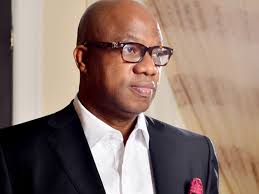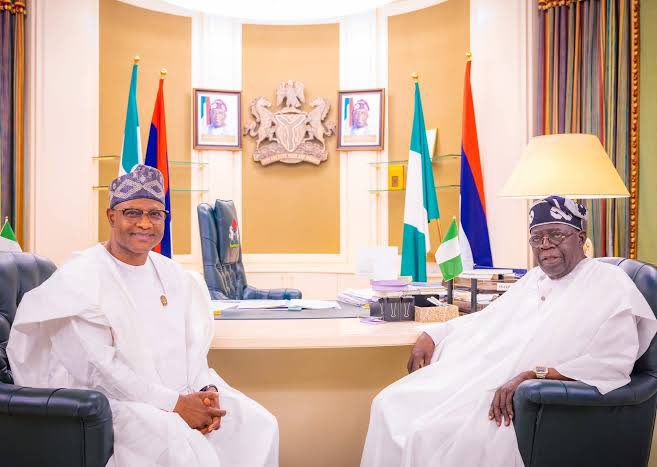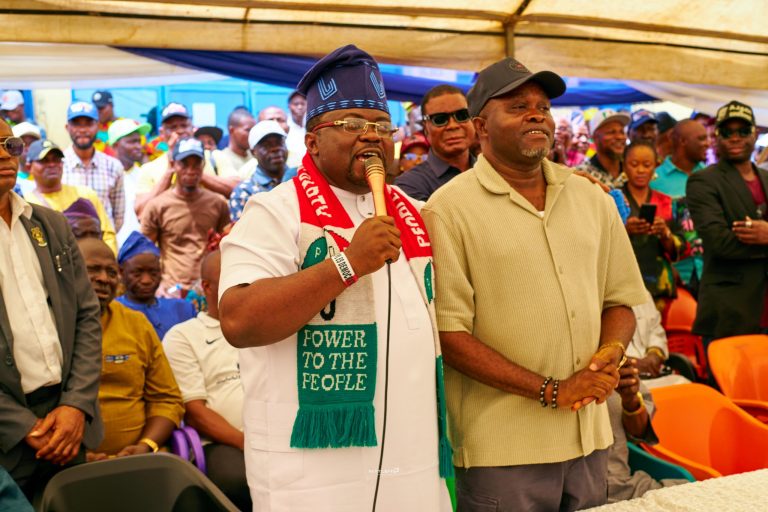Politics
RT. HON. TUNJI EGBETOKUN: THE SCANVENGER AND ACHILLE’S HEEL OF EX GOVERNORS

Oyetunji Abiodun
The saying that soldiers go, soldiers come, barrack remains the same is well enunciated in the life style of Rt. Hon. Tunji Egbetokun, the former Speaker of the House of Assembly of Ogun State. He has had relationship with the last three civilian Governors in Ogun State. He has since seen himself as a power broker in each administration and at one point or the other walk away from the Governors to form coalition and lead a gorilla warfare to terminate or destroy the political carrier of each ex Governor.
Meanwhile, fate has always smile at Hon. Tunji Egbetokun as he has always been in the forefront of installing new administration in Ogun State over 16 years despite creating the problems with exiting Governor.
Let’s fast forward to 2019, Rt. Hon. Egbetokun is now sojourning with the new Governor, Prince Dapo Abiodun and is perceived and seen as one of the kitchen cabinet members and strong pillars of the new administration, the same and perfect role he played with Former Governors, Otunba Gbenga Daniel and Senator Ibikunle Amosun which eventually led to the downfall of the political empires built by the ex Governors.
The movement of Hon. Tunji Egbetokun with the new Governor of Ogun State, Prince Dapo Abiodun, to my mind is like the story Jesus Christ and Judas Iscariot in the Holy Bible. As long as the Governor can trust his Super confidant and strategist, he must be conscious and wary of his antecedents and the inborn traits embedded in the former Speaker.
The antecedent of Hon. Tunji Egbetokun revealed that he joined forces with Otunba Gbenga Daniel and others to rig Chief Olusegun Osoba out of office in 2003 election. In 2009, the same Hon. Tunji Egbetokun emerged as House Speaker through civilian coup against the then Speaker, Rt. Hon. Titi Oseni, who trusted the man so much but led the members of the House to remove and replace her as the Speaker, in the process formed a coalition with Sen. Ibikunle Amosun and other political gladiators within and outside Ogun State to remove Otunba Gbenga Daniel from office ingloriously. He thereafter became a right hand man to Sen. Ibikunle Amosun and successfully ruled the State for over six (6) years before he abandoned the ship of SIA to lead another gorilla warfare as usual with other political heavyweights in Ogun State to exterminate the government of Sen. Ibikunle Amosun and remove him from office shamefully. Meanwhile, it should be noted that out of every hundred misdeeds or misrule of Sen. Ibikunle Amosun as the Governor of Ogun State, The wolf, Hon. Tunji Egbetokun, executed or facilitated seventy.
Now, it’s the turn and time of Prince Dapo Abiodun, MFR, Hon. Tunji Egbetokun is hobnobbing with the new Governor like a new Bride and like the MTN advert, “everywhere you go”. Prince Dapo Abiodun must be very careful with the likes of Hon. Tunji Egbetokun around him as they can swim with him now but later drown him if due care is not taken to protect his office and personality. Hon. Tunji Egbetokun was one of the architects of the misrule of Otunba Gbenga Daniel and Sen. Ibikunle Amosun, he manipulated and advised SIA to go against the progressive and developmental advice of notable elders and leaders in Ogun and APC, the party that sponsored him to power which led to the misuse of the power and highhandedness of the Governor and further created the monster Sen. Ibikunle Amosun later metamorphosed to. Hon. Tunji Egbetokun used the name and office of the Governor to commit several atrocities ascribed to and in the name of Sen. Ibikunle Amosun between 2011 and 2016.
The galant Hon. Tunji Egbetokun worked assiduously to destroy the good deeds and intentions of Otunba Gbenga Daniel as the governor of Ogun State even when he was a beneficiary of the same government. Hon. Tunji Egbetokun recreated Otunba Gbenga Daniel as a demon by manipulating personal and privileged information at his disposal to destroy a man that relaunched him politically and made him financially.
Mr. Governor, be prepared that the man known and called Hon. Tunji Egbetokun is a wolf in human figure and can turn against you when you no longer water his thirst for material things and financial request as he is indeed a great fighter, strategist and manipulator. I humbly advice that you contact your friends like Otunba Gbenga Daniel and Senator Ibikunle Amosun, who had personal contacts and relationship with Hon. Tunji Egbetokun during their administrations in Ogun State.
People say that experience is the best teacher, tap from the experiences of previous Governors who fell through the hatchet work of the evil genius, so as not to fall into the pit they fell into. If Tunji Egbetokun is a friend to anyone, then the person needs no other enemy.
The leadership of APC Ogun State Chapter should watch out for this greedy and evil genius who parades himself as a faithful member of the party. Also the Governor must not sleep and close the two eyes while the man called Hon Tunji Egbetokun is still around him.
Oyetunji Abiodun wrote from Abeokuta
Politics
Gov. Dauda Lawal commissions projects in Anka LGA, Commits to Sustainable Development

Gov. Dauda Lawal commissions projects in Anka LGA, Commits to Sustainable Development
The Executive Governor of Zamfara State, Dr. Dauda Lawal, has reiterated his administration’s steadfast commitment to guiding Zamfara State towards sustainable development by inaugurating and initiating a series of pivotal projects in the Anka Local Government Area.
Among the key undertakings announced are the comprehensive reconstruction and modernization of the Emir of Anka’s palace, signaling a revitalization of traditional leadership; the initiation of work on the crucial Anka–Abbare Road, which is expected to significantly improve connectivity; and the construction of a new Local Government Secretariat.
Additionally, the projects encompass the establishment of dedicated offices for the Hisbah Commission and the Community Protection Guards, alongside the reconstruction of the Safe School in Anka, emphasizing the administration’s focus on enhancing educational infrastructure.
During the commissioning event, Governor Lawal highlighted that these projects are a fulfillment of commitments made during his campaign, aimed at transforming the local landscape by improving infrastructure, stimulating economic growth, bolstering public service efficiency, and enhancing the capacities of security agencies. He called for a collective effort from the community to ensure proper maintenance of these facilities, underscoring the shared responsibility in preserving public assets.
Governor Lawal shared that similar projects have also been inaugurated in Tsafe, with plans for upcoming projects in Kaura Namoda, Moriki, Bungudu, Bukkuyum, and Zurmi, all expected to be completed and inaugurated by the year’s end. This ambitious timeline reflects the administration’s urgency in addressing the development needs of various regions within the state.
In his remarks, the governor urged residents and local traditional institutions to collaborate closely in maintaining the newly commissioned structures and supporting the overarching objectives of his administration. “I stand here in Anka today to honor our commitments to the people of Anka Local Government and all of Zamfara State. The official opening of the new palace for the ‘Sarkin Zamfaran Anka’ and the Zamfara State Council of Chiefs is a significant milestone that wraps up today’s agenda,” he stated.
Governor Lawal emphasized the strategic importance of the Anka–Abbare Road, describing it as a critical artery that will not only enhance access to remote areas but also stimulate economic activities and generate multiplier effects throughout the local economy. He articulated the necessity of providing a conducive work environment for civil servants, affirming that the new local government secretariat and dedicated offices will significantly contribute to strengthening law and order within the state.
“Education is the cornerstone of any thriving society. Our focused initiatives are oriented towards fostering a safe, secure, and supportive environment for our students. I am also proud to announce the completion and commissioning of the reconstructed SAFE School Anka today,” he remarked, reaffirming the administration’s dedication to education.
The governor further noted that the commissioning of the Emir’s Palace serves to restore the historical prominence of traditional institutions, which he regards as pivotal custodians of the region’s culture and heritage. He underlined the administration’s awareness of the invaluable role that these institutions play in fostering the state’s growth and emphasized the necessity of aligning development projects with cultural values.
In conclusion, the governor mentioned that after the successful commissioning in Anka and Tsafe, future projects in Kaura Namoda and Moriki will follow suit, while those in Bungudu, Bukkuyum, and Zurmi remain on track for completion and official commissioning before the year concludes.
news
GEN CHRISTOPHER GWABIN MUSA SUPPORT INITIATIVE HAILS GOVERNOR UBA SANI’S APPOINTMENT AS RENEWED HOPE AMBASSADOR

GEN CHRISTOPHER GWABIN MUSA SUPPORT INITIATIVE HAILS GOVERNOR UBA SANI’S APPOINTMENT AS RENEWED HOPE AMBASSADOR
The Gen Christopher Gwabin Musa Support Initiative (GCGMSI) has extended its warm congratulations to His Excellency, Mallam Uba Sani, the Executive Governor of Kaduna State, following his recent appointment as a Renewed Hope Ambassador and Deputy Director-General for Party Outreach, Engagement, and Mobilisation by the All Progressives Congress (APC).
This felicitation was formally conveyed in a statement signed by the Initiative’s Convener, Ibrahim Dahiru Danfulani, Sadaukin Garkuwan Keffi/Betara Biu, and disseminated to the press.
The statement highlighted that the Grand Patron of the GCGMSI, His Excellency General Christopher Gwabin Musa, OFR, Minister of Defence of the Federal Republic of Nigeria, received the news of the appointment with great pride but without surprise. According to the statement, General Musa expressed unwavering confidence in Governor Uba Sani’s proven capability and salient leadership qualities, affirming that the Governor is eminently equipped to deliver on every task entrusted to him.
The Grand Patron further extended profound appreciation to the President and Commander-in-Chief of the Armed Forces, His Excellency Asiwaju Bola Ahmed Tinubu, GCFR, for recognising and finding Governor Uba Sani worthy of this critical national assignment. The appointment, which takes effect immediately, was made by the President in his capacity as the leader of the APC, citing the Governor’s exceptional organisational abilities and strategic acumen.
In his new role, Governor Sani is tasked with working in close collaboration with the Director-General of the Renewed Hope Ambassadors and the party hierarchy, including the National Chairman of the APC. His primary mandate is to ensure harmony, inclusiveness, and strategic coordination across all levels of the party’s mobilization and engagement architecture, a vital function for advancing the political agenda.
Demonstrating its commitment to national service and effective governance, the GCGMSI, under the direct directive of its Grand Patron, General Musa, has officially mobilised its formidable structure. The Initiative has pledged the full deployment of its extensive network, seasoned personnel, and robust operational framework to assist and support Governor Uba Sani in the successful execution of his new responsibilities.
The Gen Christopher Gwabin Musa Support Initiative, renowned for its disciplined organisation, widespread grassroots penetration, and capacity for large-scale civic mobilisation, stands ready as a pivotal force. This move underscores the GCGMSI’s pivotal role as a key support system for national development initiatives and its unwavering dedication to fostering unity and progress under the Renewed Hope agenda.
Politics
Oyo 2027: Ajadi Says PDP Will Retain Power

Oyo 2027: Ajadi Says PDP Will Retain Power
…..Tasks PMS To Remain United, Peaceful
A leading People’s Democratic Party (PDP) governorship aspirant in Oyo State, Ambassador Olufemi Ajadi Oguntoyinbo, has urged the people of Oyo State to remain steadfast, saying they will continue to enjoy good governance because the PDP will produce the next governor in the 2027 general elections.
Ajadi, who made this known while addressing transport unions under the Park Management System (PMS) at their headquarters, New Garage, Ibadan, on Tuesday, urged the park managers to remain united and maintain the love and peace currently prevalent among them.
According to him, “My advice to the Park Managers and the commercial drivers in Oyo State is that they should continue the love and peaceful attitudes. They should remain united. They should not ‘scattelegs’.
“Don’t let anybody deceive you, remain steadfast. Let me assure you that our party, the PDP, will produce the next governor come 2027,” Ajadi said.
He said he came to the PMS headquarters to meet with transporters and park managers to inform them of his aspiration to serve the people of Oyo State as governor come 2027.
“Today I joined my people, the park managers in Oyo State, to familiarize myself with them and inform them of my intention to serve the people of Oyo State as the next governor by the Grace of God.”
On the plans for the transporters, Ajadi said he first wants to change the look of the City Cabs, which will be done in collaboration with the Park Management System.
He also plans to increase the number of Mass Transit buses and make them available in all locations of the State.
He said the Mass Transit buses will operate in partnership with the Park Managers.
Ajadi, who commended Governor Makinde on the newly established bus terminals in the State, said his government will ensure adequate usage of the facilities.age of the facilities.
-

 celebrity radar - gossips6 months ago
celebrity radar - gossips6 months agoWhy Babangida’s Hilltop Home Became Nigeria’s Political “Mecca”
-

 society6 months ago
society6 months agoPower is a Loan, Not a Possession: The Sacred Duty of Planting People
-

 news6 months ago
news6 months agoTHE APPOINTMENT OF WASIU AYINDE BY THE FEDERAL GOVERNMENT AS AN AMBASSADOR SOUNDS EMBARRASSING
-

 society5 months ago
society5 months agoReligion: Africa’s Oldest Weapon of Enslavement and the Forgotten Truth









You must be logged in to post a comment Login